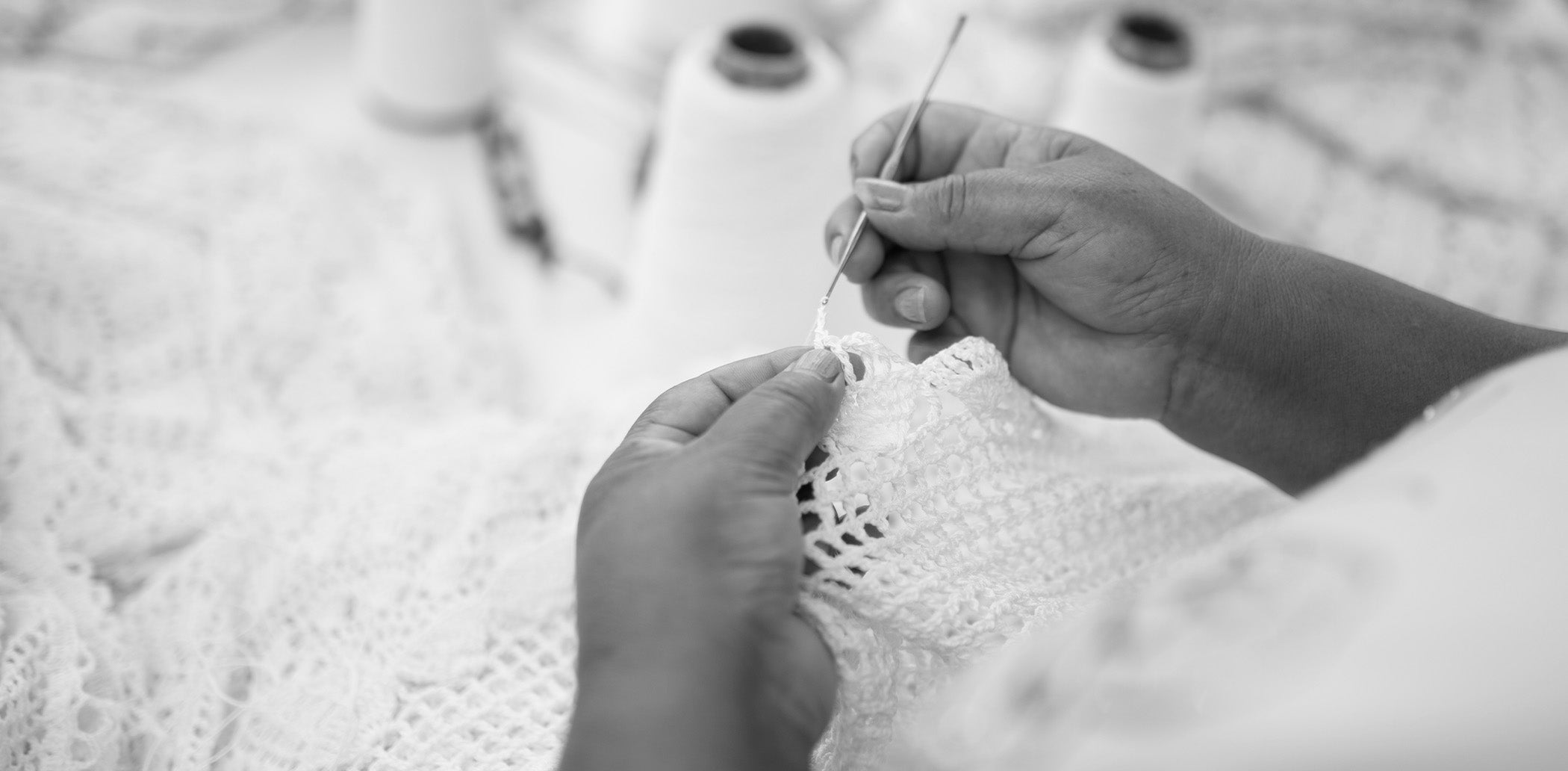Glossary
Impact
Fabrics made with animal-based fibers from certified, traceable supply chains, such as ZQ Wool and Sustainable Fibre Alliance (SFA) cashmere. These fibers are sourced in accordance with our Animal Welfare Policy, which is grounded in internationally recognized animal welfare principles, including the Five Freedoms and the Five Domains model.
Made expertly by artisans using heritage or craft techniques, unique to their countries and regions.
Fabrics made with cleaner chemistry, certified to standards such as the Global Organic Textile Standard, OEKO-TEX STANDARD 100, and the Leather Working Group. Cleaner chemistry enhances worker safety and reduces manufacturing pollution, while ensuring that the final fabrics comply with strict chemical standards.
Fabrics made with innovative fibers designed to have a lower environmental impact than conventional alternatives. These may include recycled fibers or materials produced in closed-loop systems, which reuse inputs like water and significantly reduce waste. Other innovations include Next Generation (NextGen) materials—alternatives to animal- or fossil fuel–based inputs—that may be plant-based, lab-grown, or bioengineered.
Made locally near our headquarters in Los Angeles in the LA Fashion District. Note: The garment might be made of imported fabrics and trims.
Fabrics made from organic fibers, certified to standards such as the Global Organic Textile Standard or the Organic Content Standard, ensuring adherence to stringent environmental and social criteria. Organic cotton is grown using responsible farming practices—such as crop rotation, biological pest control, and careful management of chemical inputs—that support worker wellbeing, enhance soil health, protect biodiversity, and reduce water pollution.
While all of our factory partners have been carefully selected to align to our responsible sourcing and manufacturing standards, we want to highlight to those partners who take extra care in championing impact work. Our Preferred Partner Impact Icon indicates that this partner goes above and beyond in their social and environmental initiatives—such as carbon reduction efforts, advanced water and chemical management, advanced worker protection or enhancement programs, and more.
Fabrics made with all or some recycled fibers, with recycled content certified to standards such as the Global Recycle Standard or the Recycled Claim Standard. Recycled materials contribute to a circular economy by keeping existing materials in use, diverting waste from landfill, and reducing the use of virgin inputs.
Fabrics made from fibers grown using regenerative farming practices, certified to standards such as Good Earth Cotton. Regenerative farming is a holistic approach that aims to improve soil health, enhance biodiversity, and support resilient water systems—helping restore ecosystems and sustain productive farmland for future generations.
Indicates that the fibre comes from suppliers that prioritize the protection of ancient and endangered forests, either through certified forest-management systems (such as FSC) and/or participation in Canopy initiatives that promote low-risk, responsible sourcing and greater transparency across the supply chain.
Fabrics made from renewable fibers—such as certified SFA cashmere and European Flax™—that are sourced from supply chains committed to responsible land and animal management. Renewable fibers are materials that can naturally regenerate over time, but we require additional certification and traceability to ensure strong environmental, social, and chemical practices across the entire value chain.
Made using practices that prioritize responsible water use and wastewater management, certified to standards such as the Global Organic Textile Standard (GOTS) and OEKO-TEX® STeP. These standards include strict water stewardship criteria and can be implemented at multiple stages—from raw material farming to textile processing and garment finishing—to reduce water waste and prevent pollution.
Made in factory hosting the women's empowerment training program called Reimagining Industry to Support Equality (RISE). This initiative supports collaborative industry action at scale to advance gender equality in the global garment, footwear and home textiles value chains. Its mission is to empower women workers, embed gender equality in business practices and catalyze systems change.
Made in a women owned or co-owned facility. As a women-run brand, we prioritize partnering with minority-owned facilities across our value chain.
Other
We carefully choose the type and weight of fabric that we use for each of our designs. Each fabric varies in sheerness, depending on a number of factors including base color, print, weave, and weight. To help determine how sheer a garment will be, we've created a Sheerness Scale, with 1 being the most sheer and 6 being the most opaque. For those styles that fall on the more sheer end of the spectrum (1 or 2), we recommend layering over one of our viscose slips or slip skirts for additional coverage.
Our Heirloom garments are made with love and the intention to be collected and handed down for generations to come. The Heirloom styles are made in small batches and limited quantities due to the special techniques, processes, meticulous craftsmanship, and luxe fabrications. Each collection will include Heirloom styles and the items will be labeled as such.
Our eco-shippers are made from glassine (derived from 100% recycled content and a minimum of 90% post-consumer content) and are 100% recyclable, biodegradable, and compostable. In 2022, we implemented the use of our glassine bags to ship our products as a next step in eliminating the use of plastic in our supply chain. The glassine bag is made with paper, cellulose, and vegetable ink, making it naturally compostable and easily curbside recyclable. The new bag meets the ASTM D6400 standard for certifying compostable products and, through testing, we’ve found that the new glassine packaging converted into compost in just 30 days, as compared to the 12 week requirement to meet this standard. These bags are shipped to our manufacturers and each garment you receive has made its journey from our manufacturing partners to your home in this one protective pouch, eliminating unnecessary packaging waste along the way.




